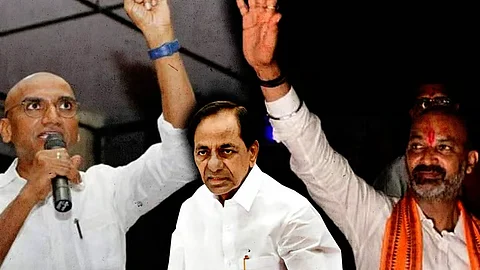

Prior to the formation of Telangana state, when Justice Sri Krishna was tasked with coming up with a report on whether Andhra Pradesh should be bifurcated, the people who spoke to the Commission expressed three apprehensions. One was that richer dominant castes – non Reddy-Kamma upper castes and richer OBC castes – were power playing – and that once the bifurcation issue was settled, the political power in the state would remain vested in the hands of few. The second concern was over the rise of Naxalism and left-wing extremism as Andhra Pradesh already had strong naxalite groups. The third concern, mainly echoed by Muslims in Hyderabad, who constitute 41% of the city’s population, was that a separate state would ‘expose them to communally sensitive Hyderabad and Hindu-biased rural population of the region’.
Contemporary political history shows the first of the apprehensions is apparent, while there is an element of impossibility of the second one becoming a reality, given how powerful the state apparatus is. However, the third – rise of communalism – seems to have crept into political and social spheres.
Within less than a week, it will be clear what the future holds for the nine-year-old Telangana state. All political parties, across ideological lines, are investing in their best to formulate the next elected government.
The Telangana Rashtra Samithi, which later transformed into the Bharat Rashtra Samithi (BRS) under the leadership of Chief Minister K Chandrashekhar Rao (KCR), is aiming to score a hat trick. The star campaigners of the party, primarily KCR’s extended family, have been showcasing the government’s achievements in the last nine years and asserting that developmental work in the state will continue if they are re-elected.
The Congress, led by Revanth Reddy, who was once a Telugu Desam Party (TDP) big shot, is seeking power projecting itself as the party that gifted the state of Telangana itself. The party, amidst its perennial internal rifts, wants to unseat the BRS by exposing its irregularities and alleged scams.
Another man in the fray, former police officer Dr RS Praveen Kumar, has managed to garner a political base with the promise of liberating Telangana from the clutches of dominant social castes. What the Bahujan Samaj Party (BSP) under his leadership managed to achieve much before the elections is a testament to their successful politics. Their influence can’t be denied in forcing a politician like KCR to invoke BSP founder Kanshi Ram’s name in the first political meeting that he held after renaming his party.
Political parties will do politics, but it is their chosen paths and ideologies that eventually manifest into social systems and determine social progress. The Bharatiya Janata Party (BJP), which wants to become a force to reckon with in Telangana, began its communal campaign with its tried and tested Hindu-Muslim polarisation during the 2020 Greater Hyderabad Municipal Corporation (GHMC) elections.
Following the physical assaults on rationalists and social media trolling of women activists, journalists, and professors, intellectuals have repeatedly alleged that formal and informal functionaries of the BJP are behind these acts of aggression. These aggressive tactics have increased the fanbase for Hindutva if not for the BJP. The BJP has also been relentless in its attack on the BRS-led state government, calling KCR a feudal lord (dora) and his government the hotbed of corruption.
Recently, the BJP has focused on ‘weaker sections’ and on ‘social justice’, in a move to corner the BRS and Congress, and to draw a pair of Backward Class (BC) communities and Madigas, a numerically strong yet socially oppressed Dalit caste. It is to be seen if the promises made by Narendra Modi himself to these people are mere election stunts and would be forgotten soon.
Irrespective of how the BJP fares this election, its political culture laced with communal rhetoric has already got considerable legitimacy among a section of the polity. This project cannot be undone easily as it is being sustained by an ecosystem that is disguised as the culture.
Within a decade of the formation of the state, the danger is already banging on the door in the form of speeches by BJP leaders such as Bandi Sanjay who wants certain Muslim religious spaces dug up to see what lies beneath, through elaborate saffron rallies and mobilisation around the personality of Chatrapati Shivaji.
What awaits future Telangana?
Across the globe there is a strong right-wing tilt and India is not an exception, except its form and deceptive operative style makes it different.
Under the BJP, its Union government and (BJP) state governments are playing a key role in the naturalisation of the violence and discrimination against religious minorities besides crushing dissent.
On one hand, it captures its rivals by hook or crook to topple the state governments; on the other hand, it teaches lessons on India being the ‘mother of democracy’. Ironically, this might help the BJP to become ‘a single party system’ but dents the country’s journey towards nuanced democratisation in light of a modern constitution that envisions moving away from mediaeval, retrograde thoughts.
The four MP seats which the BJP bagged in the 2019 general elections in Telangana, its strength in the GHMC elections, and win in two bye-elections have boosted the already hyper communal machine to use different avenues ranging from cinema, history to festivities and religious spaces.
By the next elections, the communal bogie that has been launched in Telangana will join the BJP’s nationwide Hindutva ethnocracy project, and it won’t be a surprise if the party writes ‘a new history’ given the state’s sensitive and troubled past.
Charan Teja is an independent journalist who predominantly reports and writes on rural affairs, caste, politics, and forest/environmental rights from both the Telugu states.
Views expressed are the author’s own.
With Telangana, Mizoram, MP, Chhattisgarh, and Rajasthan on the ballot, TNM and Newslaundry have teamed up to bring you the most comprehensive reporting and analysis. Click here to power our election coverage.